Iran's Interior Minister Plays Down Border Conflict With Taliban
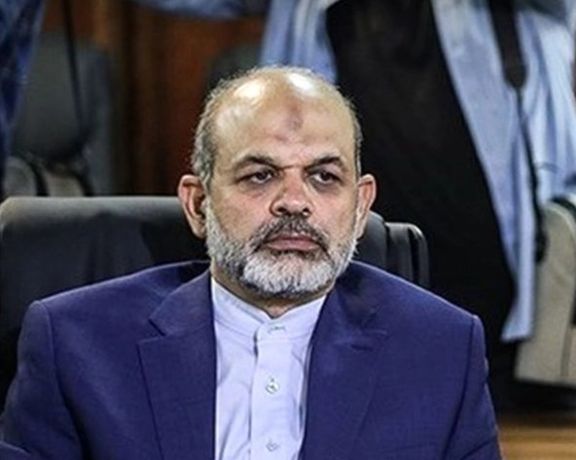
Two days after the deadly clash on the Iran-Afghanistan border, Iran's Interior Minister described the incident as a "brief conflict".

Two days after the deadly clash on the Iran-Afghanistan border, Iran's Interior Minister described the incident as a "brief conflict".
Ahmad Vahidi said Monday that "the issue was resolved after negotiations were held with the Taliban," playing down the severity of the clash.
"There was a cross-border shooting by the Afghan border guards, and naturally, they were given an appropriate response."
"Currently, there is no problem, and the border is open and in peace," added Vahidi.
Clashes at the border on Saturday over water rights claimed the lives of at least two Iranians and one Taliban soldier. According to a report by Iranian reformist daily newspaper Ham-Mihan, about 50 Iranians have been killed in border regions since 2020.
Despite Tehran’s claims that the clashes are over, and the situation is in control, Taliban sources have released videos of capturing an outpost inside Iran.
Earlier, Abolfazl Zohrevand, the former ambassador of Iran in Kabul, described the conflict as "a serious war" in an interview with Entekhab website saying that the conflict could be resumed.
On Sunday, Qasem Rezaei, deputy commander of Iran's Law Enforcement Forces and Kiumars Heydari, the Commander of the Iranian Army's Ground Forces, traveled to Sistan-Baluchestan province bordering Afghanistan to probe the situation.
Disputes between Tehran and Kabul have risen over the Taliban’s obstruction of Iran's access to Helmand River water in violation of a 1973 treaty.
Iran has accused Afghanistan's Taliban of violating a 1973 treaty by restricting the flow of water from the Helmand River to Iran's parched eastern regions, an accusation denied by the Taliban.
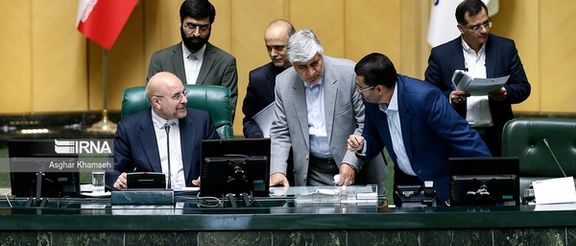
An Iranian lawmaker who has disclosed a major case of financial corruption at the parliament says he has been barred from speaking during legislative sessions.
Ahmad Alirezabeigi, the member of parliament from Tabriz says he has not even been allowed to make brief comments on the proceedings at the Iranian Parliament (Majles). He added that the authorities have muted his desk microphone.
"I have asked twice to make brief comments on the legislations being discussed at the Majles but I have been denied the permission to speak," Alirezabeigi told Etemad Online. He added: "I expect the Majles presidium to intervene in the matter and defend my rights as a member of parliament."
His comment sounded odd as it is the presidium that allows MPs to speak or mutes their microphone to bar them from commenting. Alirezabeigi said that presidium members should resign if they cannot restore lawmakers' rights.
He reiterated that no one may prevent a member of the parliament from expressing his views during sessions. "Article 75 of the Majles internal regulations in particular says that lawmakers should be given a chance to respond to accusations made against them at the parliament," he said.
Following the disclosure involving nearly 140 SUVs given to lawmakers at extremely discounted prices to bribe them to stop an impeachment motion against a former industry minister, Alirezabeigi has been questioned by a prosecutor and an investigation committee at the parliament.
The lawmaker told Etemad Online that he thinks "a secret power is trying to prevent me from fulfilling my responsibility as a member of the parliament," however, he did not name anyone.
Alirezabeigi said elsewhere that even the ethics committee, which questioned him following the disclosure about the bribes is not legally authorized to bar him from speaking at the Majles.
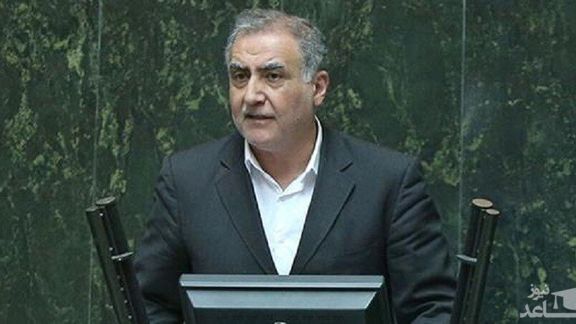
Majles Speaker Mohammad Bagher Ghalibaf, a former IRGC general, has been often criticized by some lawmakers and other politicians for running the parliament like a military garrison. Khabar Online Website has quoted lawmakers as having said that "by running the parliament like a military center, Ghalibaf has made the legislature useless."
According to Khabar Online, criticism of Ghalibaf's leadership at the Majles surfaced when he stopped impeachment motions for ministers in a bid allegedly to support President Ebrahim Raisi.
A video posted on Fararu website on Saturday showed Ghalibaf threatening lawmakers to name those who do not work hard enough or refuse to take part in voting.
At another level, politicians in Iran have often criticized Ghalibaf and other lawmakers for making the parliament so weak that key decisions on issues such as raising fuel prices or the final decisions on the annual budget are made at a meeting between the heads of the three government branches rather than by lawmakers.
Other key issues such as the decision to accept the terms of the international financial watchdog, the FATF have been referred by Supreme Leader Ali Khamenei to the Expediency Council, apparently as he has deemed the Majles not knowledgeable enough about the matter.
The Council is a collection of aging clerics and demoted politicians susceptible to pressures by Khamenei’s henchmen.
Meanwhile, the Supreme Leader makes many decisions such as sending troops to Syria or giving weapons to Russia to help Putin in the war against Ukraine without consulting the parliament.
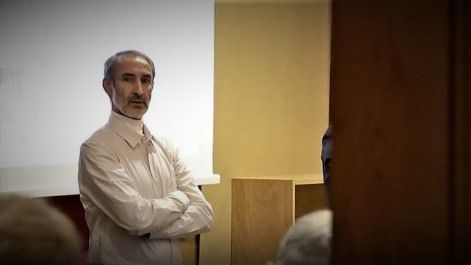
Iranian authorities say efforts are underway to release Hamid Nouri, a former Iranian jailor who is serving a life sentence in Sweden.
Nouri, 61, was given a life sentence last July for his leading role in the massacre of large numbers of jailed opposition members at Gohardasht Prison in July and August 1988.
Askar Jalalian, Deputy Director of International Affairs and Human Rights at the Ministry of Justice, called prospects of his release "good news”.
The development comes after Iranian diplomat Assadollah Assadi, convicted of terrorism, was freed on Friday in exchange for a Belgian aid worker, causing global outrage.
Assadi, a former attaché at the Iranian embassy in Austria, was convicted of plotting to bomb a gathering of the exiled opposition group Mujahedin-e Khalq Organization (MEK) near Paris on June 30, 2018.
Belgian Olivier Vandecasteele, who was detained in 2022 and sentenced to 40 years in prison and 74 lashes for alleged “spying and cooperation with the United States, money laundering and smuggling $500,000 out of Iran,” was also released as part of a deal mediated by Oman.
Critics of the deal warned that such a treaty would effectively establish Belgium as a “sanctuary country” for terrorist operations, and a haven for Iranian intelligence services to maintain a European command center, setting a dangerous precedent for the future.
Iran has become notorious for its ‘diplomatic hostage taking’ and the latest developments are causing alarm among rights groups and international diplomatic circles that the tactic is succeeding.
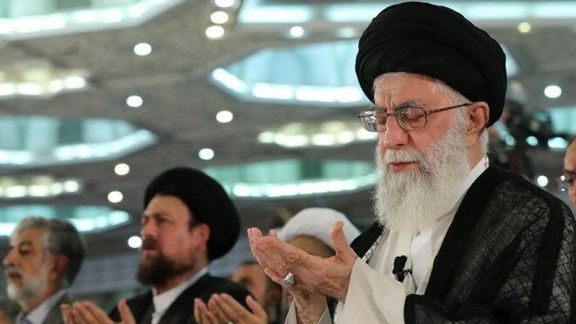
Recent media reports in Iran indicate that local observers are increasingly convinced the revival of the 2015 nuclear deal (JCPOA) is impossible.
The latest report in reformist daily Shargh on the issue, which has also been carried by other media outlets such as Iran Diplomacy and Rouydad24, says some officials have been considering alternative solutions.
Shargh relying on recent statements by several Iranian politicians and pundits said that perhaps the best route to resolve the nuclear dispute is direct talks between Iran and the United States, something that Supreme Leader Ali Khamenei has forbidden.
While several Iranian and international observers are still considering Khamenei's latest reference to "heroic flexibility"as an allusion to the feasibility of an agreement with the West, his reference to the Shiite principle of Taqiyyah based on which Shiites can prudently hide their real beliefs and goals, and his explanation that heroic flexibility is "a way of circumventing a rock on the way of your progress" put an end to all hopes about a possible softening of Iran's stances.
In other words, for Khamenei nuclear talks are a means to neutralize foreign opposition while following his real objectives.
As a result, some observers characterized Khamenei's rhetoric as a double-edged guidance to Iranian diplomats. It is characteristic of Khamenei to make statements in order to evade responsibility if his suggestions lead to a failure and to claim victory if they happen to gain something for the Islamic Republic.

In the meantime, Iranian officials including Foreign Minister Hossein Amir-Abdolahian make occasional statements about secret talks with the United States. The latter has repeatedly refuted such statements and labelled them as lies.
In one of the latest developments, five years since the collapse of the JCPOA nuclear talks, dozens of ex-US diplomats have called to end diplomatic overtures to Tehran.
The report in Shargh said that boosting of Iran's nuclear activities since 2021 is one of the reasons why observers believe that the JCPOA can no longer be revived. Another obstacle is Iran's insistence on its financial demands before returning to the negotiations. However, a key problem is that the deadlines to lift the embargo on Iran's missile development and nuclear activities respectively in October 2023 and 2025 are getting closer quickly.
Shargh noted that the current 5+1 has no similarity to the P5+1 in 2015. There is a vast divide between Russia and the four Western partners of the JCPOA and the relations between China and the United States are no longer friendly. Changes have even occurred between the four Western partners. Last March the three European partners demanded an IAEA resolution against Iran, but the United States disagreed with them, which was a reversal of roles compared to the past. In the meantime, Iran's involvement in Russia's war against Ukraine has also changed many things. No one in the West supports the lifting of sanction on Iran, and doing so will be costly for Western governments.
In this situation, the Biden Administration has said that "The JCPOA is no longer on the agenda, however, the problem with Iran can be solved only through diplomatic ways." The policy of "neither JCPOA, nor crisis" just gives Biden one less subject to worry about. At the same time, some Western officials have been talking about an interim agreement or "less for less," Iran has not yet agreed with that.
Meanwhile, Israel's insistence on posing a "valid military threat" against Iran's nuclear program and two joint military exercises with the United States in November 2022 and January 2023 have made the matter even more complicated.
Under the circumstances, according to experts quoted by Shargh, Iran's constant rhetoric about its readiness to return to the JCPOA and its continued efforts to boost its nuclear capabilities exert pressure on the West. At the same time, unwanted consequences are also probable in the absence of a dialogue.

Israeli missile strikes targeted sites on the outskirts of the Syrian capital Damascus Sunday, while Syrian state media reported that some missiles were intercepted.
Citing a Syrian military source, SANA said missile strikes coming from the direction of the Israeli-occupied Golan Heights had targeted several sites it did not identify, adding that there were no casualties
"Our air defenses confronted the aggressors' missiles and downed some of them with only material losses," the Syrian military source said.
According to the Britain-based Syrian Observatory for Human Rights, two salvos of missiles were fired at a Syrian Air Force base housing militias of Iran-backed Lebanese group Hezbollah in Hafir Al-Foka area in Rif Dimashq, Al-Hama area and the area of Damascus International Airport.
Israel has for years carried out attacks on what it has described as Iran-linked targets in Syria, where Tehran's influence has grown since it began supporting President Bashar al-Assad in a civil war that started in 2011.
The strikes are part of an escalation of what has been a low-intensity conflict with a goal of slowing Iran's growing entrenchment in Syria, Israeli military experts say.
Fighters allied to Iran, including Hezbollah, now hold sway in vast areas in eastern, southern, and northwestern Syria and in several suburbs around the capital.
In April, Israel attacked targets in Syria hitting two bases where Iranian forces operate in Homs province earlier this month killing at least two Iranian officers.
Iran says its officers serve in an advisory role in Syria at the invitation of Damascus. Hundreds of Iranian forces and thousands of proxy militiamen including senior officers have been killed in Syria during the war.
(With reporting by Reuters)

Oman’s sultan arrived in Iran on Sunday for a two-day visit and met with President Ebrahim Raisi in a visit expected to focus on regional diplomatic and security issues.
The visit by Sultan Haitham bin Tariq al-Said came two days after Muscat mediated a prisoner swap between Iran and Belgium.
Oman has traditionally been an interlocutor between the West with the IslamicRepublic and has mediated the release of several foreign citizens and dual nationals held hostage by Iran.
On Friday, Oman helped secure the release of a Belgian aid worker, who was arrested in 2022 and sentenced to 40 years in prison and 74 lashes on trumped-up charges including spying, in exchange for Iranian diplomat and intelligence agent Assadollah Assadi sentenced to 20 years in prison for a failed bomb plot in France against exiled opposition group Mujahideen-e Khalq (MEK).
Dozens of foreigners and dual nationals still remain in jail in Iran, most facing espionage and security-related accusations. Rights groups have criticized the arrests as a hostage-taking tactic by Tehran to win concessions from the West.
Iran and Oman on Sunday signed four documents to improve cooperation in various sectors in the fields of e economic, energy and investment as well as free economic zones.
The documents were inked by Iranian ministers of petroleum, economic affairs and finance as well as the secretary-general of the Supreme Council of Free Trade-Industrial and Special Economic Zones and Omani minister of energy, finance and trade.
The visit comes as Iran also faces renewed criticism of its human rights record and its supply of drones for the Russian invasion of Ukraine.